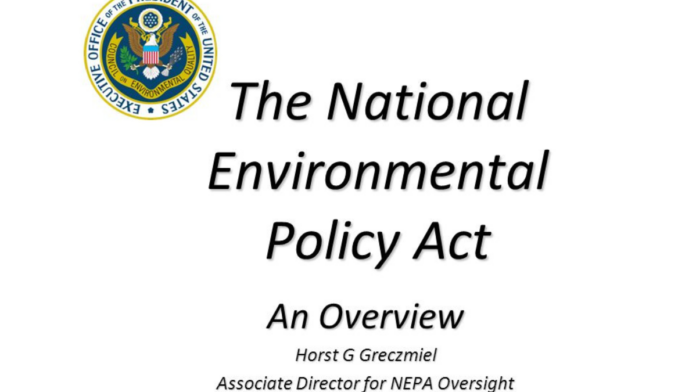Environmental reviews mandated by the federal government take far too long and hold up necessary infrastructure projects across the West, according to community leaders, tribes, farmers, and business groups that weighed in on reform of the 50-year-old National Environmental Policy Act (NEPA) this week.
NEPA requires relevant federal agencies to “consider the environmental effects of proposed major Federal actions.” The law applies to most infrastructure projects, energy development projects and the management of grazing, forests, and other activities on federal lands.
The proposed reforms announced on January 10th by the Council on Environmental Quality would impose page and time limits to reduce the length of the review process.
“NEPA was never intended to interfere with substantive agency decision making or to overturn legislative federal land management decisions, such as the use of federal lands for multiple use,” wrote James Brown, director of public affairs for the Montana Wool Growers Association (MWGA), in a letter submitted to the docket. Brown explained that environmentalists abuse the review process to delay development projects.
“In reality, NEPA’s procedural requirements are being used as the legal hammer for Federal Courts to mandate particular land use and permitting decisions and/or to reach substantive outcomes that are different than those reached by the impacted federal agency or by Congress,” he continued. “This is wrong.”
According to a report cited by the MWGA, the BLM takes an average of 4.5 years to complete an Environmental Impact Statement, a situation that it called “unbelievable” and said interfered with livestock producers’ ability to plan for the long term.
This sentiment is shared by tribal offices. The Southern Ute tribal government argues that many projects require approval from more than one federal agency and the process of obtaining their input causes confusion and delay, which increase the cost of projects.
“The Tribe has long advocated for many of the changes that CEQ is proposing to its regulations. The Tribe appreciates CEQ’s efforts to modernize and clarify the regulations to facilitate more efficient, effective, and timely NEPA reviews by federal agencies in connection with proposals for agency action,” wrote Christine Sage, Chairman of the Southern Ute Indian Tribal Council.
Nor are farmers, ranchers, and tribal councils the only ones struggling to work around delays. Local governments and state transportation departments expressed frustration over backlogs in construction of highways, pipelines, and other infrastructure projects.
“Overall, lead agencies need flexibility to conduct environmental reviews in a way that minimizes the financial and administrative burdens, informs public decisions, protects the environment, and avoids unintended consequences such as public or agency uncertainty or increased litigation risk,” the American Association of State Highway and Transportation Officials (AASHTO) said in their comment.
The proposed reforms would expedite the completion of transportation and other infrastructure projects, while “encourage[ing] brevity, readability, and quality writing” in NEPA materials, Jim Tymon, Executive Director of AASHTO, added.
Local governments in Utah and Colorado noted the need to move quickly on infrastructure projects and avoid unnecessary, “weaponized” lawsuits by activists.
“We agree that NEPA has all too often been used as a tool by non-government organizations to delay or stop needed infrastructure projects across the country,” wrote Duchesne County, Utah Commissioners Greg Todd, Irene Hansen, and Greg Miles. “The proposed rules will hopefully slow, but will unlikely stop, the never-ending litigation that lines the pockets of NGP attorneys at the expense of American taxpayers.”
Mesa County, Colorado commissioners agreed.
“It is our belief that the proposed NEPA reforms will not stop federal agencies from protecting the environment, but the revisions will aid in accelerating job creation, increasing local tax revenue, and getting important projects to completion,” wrote Commissioners Scott McInnis, Rose Pugliese, and John Justman. “We believe we can have both sensible and thorough environmental reviews and an efficient process that supports development.”
They applauded “CEQ’s effort to reduce redundant, time-consuming and often costly environmental reviews. We look forward to seeing the benefits of this improved, modernized regulation as important projects move forward at the pace demanded by our thriving economy.”
Reforms to NEPA would have impacts for counties across the country, but would have particular impact for many western states grappling with integrated federal, state, and local jurisdictions. Allowing local voices to have more influence over the proceedings is important, local government say.
“Counties support revising NEPA in order to strengthen the involvement of local governments in the federal decision-making process, including clarifying the cooperating agency definition, and to expedite project analyses that deliver final decisions in a more timely and effective manner,” write Matthew D. Chase, executive director of the National Association of Counties, and Kevan P. Stone, executive director of the National Association of County Engineers.
“Local governments often find the NEPA process to be cumbersome and inefficient. Administrative burdens alone can be overwhelming for counties whose resources are limited. The proposed page and time limitations for EAs and EISs will ensure projects are appropriately studied within a reasonable timeframe,” they added.
A coalition of Arizona and New Mexico counties “with strong support from the timber, farming, livestock, mining, small business, sportsman and outfitter industries as members of the Coalition of Arizona/New Mexico Counties (Coalition),” submitted their own red line NEPA revisions. The combined 15 counties represent more than 700,000 residents in the two western states.
Meanwhile, the Alaskan government expresses similar concerns and frustrations over the delays caused by federal oversight.
“A large federal presence means that news of Environmental Impact Statements is common. It comes with ‘living in Alaska,’” wrote members of the Alaska State Senate, who expressed frustration with “the timeliness (or lack thereof)” of the EIS process and urged the federal government to take steps to ensure interagency coordination, establish two-year goals for environmental reviews, and improve federal agencies’ ability to “keep the public informed” about the decision making process.
Now that the public comment period is complete, a new ruling is expected to be released in the coming months.

